PENGUIN  CLASSICS
CLASSICS
THE PROTESTANT ETHIC AND THE SPIRIT OF CAPITALISM and Other Writings
Max Weber (18641920) was a German sociologist and historian who significantly influenced the development of modern social science through his attempts to develop a systematic methodology for cross-cultural studies. His best-known work, The Protestant Ethic and the Spirit of Capitalism (1905), linked the growth of modern capitalism to Protestant religious beliefs. It was followed by encyclopedic inquiries into the world religions, geopolitics, revolution, domination, class structure, bureaucracy, law, the city, the state, and science, culminating in the posthumously published Economy and Society (1922). For the last twenty years of his life, Weber worked as an independent scholar, accepting professorships only briefly at the Universities of Vienna (1918) and Munich (191920). Paralleling and informing Webers scientific work in sociology, economics, law, and history was a serious involvement in political questions. A vocal critic of Bismarcks political legacy and of the histrionics of Kaiser Wilhelm II, Weber championed a German parliamentary democracy based on the British and American models. He participated in the committee charged with drafting the Weimar Constitution and was also a member of the German delegation at Versailles. He died in Munich of pneumonia on June 14, 1920.
PETER BAEHR was born in Kuala Lumpur, Malaysia, in 1953 and came to England in 1962. Educated at Bournemouth College (Shelley Park) and the University of Leicester, he taught sociology at Coventry Polytechnic from 1979 to 1989 and at the Memorial University of Newfoundland from 1990 to 2000 before moving to Hong Kong, where he teaches in the Department of Politics and Sociology at Lingnan University. His publications include Caesar and the Fading of the Roman World, The Portable Hannah Arendt (editor), and Founders, Classics, Canons: Modern Disputes over the Origins and Appraisal of Sociologys Heritage.
Born in Bedford, England, in 1940, GORDON WELLS was educated at Bedford Modern School and at the Universities of Oxford and Birmingham. After a period of teaching at universities in Germany, he took up a post as lecturer in German at Coventry University (formerly Coventry Polytechnic) in 1974, a post he held until 2000. He is now a freelance translator. Published translations include The One Room by Jurek Becker and Icons by Helmut Brenske. He is coeditor and translator (with Peter Baehr) of Max Weber: The Russian Revolutions.
PENGUIN BOOKS
Published by the Penguin Group
Penguin Putnam Inc., 375 Hudson Street,
New York, New York 10014, U.S.A.
Penguin Books Ltd, 80 Strand,
London WC2R ORL, England
Penguin Books Australia Ltd, Ringwood,
Victoria, Australia
Penguin Books Canada Ltd, 10 Alcorn Avenue,
Toronto, Ontario, Canada M4V 3B2
Penguin Books (N.Z.) Ltd, 182-190 Wairau Road,
Auckland 10, New Zealand
Penguin Books Ltd, Registered Offices:
Harmondsworth, Middlesex, England
First published in Penguin Books 2002
Translation, introduction, and selection copyright Peter Baehr and Gordon C. Wells, 2002
All rights reserved
LIBRARY OF CONGRESS CATALOGING IN PUBLICATION DATA
Weber, Max, 18641920.
[Protestantische Ethik und der Geist des Kapitalismus. English]
The Protestant Ethic and the spirit of capitalism and other writings / Max Weber;
edited, translated, and with an introduction by Peter Baehr and Gordon C. Wells.
p. cm.(Penguin twentieth-century classics)
Includes bibliographical references.
Contents: The Protestant ethic and spirit of capitalismChurches and sects in North AmericaCritical remarks in response to the foregoing critical contributionsRemarks on the foregoing replyRebuttal of the critique of the spirit of capitalismA final rebuttal of Rachfahls critique of the spirit of CapitalismPrefatory remarks to collected essays on the sociology of religion
ISBN: 978-1-101-09847-9
1. CapitalismReligious aspectsChristianity. 2. Sociology, Christian. 3. Christian ethics. 4. Protestant work ethic. I. Baehr, P. (Peter) II. Wells, Gordon C. III. Title. IV. Series.
BR115.C3 W413 2002b
306.6dc21
2001133065
Except in the United States of America, this book is sold subject to the condition that it shall not, by way of trade or otherwise, be lent, resold, hired out, or otherwise circulated without the publishers prior consent in any form of binding or cover other than that in which it is published and without a similar condition including this condition being imposed on the subsequent purchaser.
Version_3
ACKNOWLEDGMENTS
A work of this kind draws on the skills and knowledge of many people. We are particularly grateful to the following individuals who gave generously of their time and their expertise by commenting on the Introduction, offering advice on an early draft of the translation, and answering our questions:
George Becker, Christian Boyens, Randall Collins, John Conway, George Frisby, Daniel Gordon, Alex Kazamias, David Kettler, Joachim von Klichen, Hartmut Lehmann, Manfred Liedtke and colleagues at the Pdagogische Hochschule, Heidelberg, Michael Matthiesen, John McCormick, Volker Meja, Stephen C. Perks, Jan Roes, Hans Rollmann, Guenther Roth, Hans Schleiff, Richard Swedberg, Jrg Thierfelder, Keith Tribe, Charles Turner, Colin Wright, and the German staff at Coventry University. Our editors footnotes drew extensively on various editions of the Encyclopaedia Britannica, Meyers Enzyklopdisches Lexikon, and the Dictionary of National Biography.
We owe a great debt to our families, especially to Hedda Schuurman and Anita Wells, for their love, help, and forbearance.
The project is dedicated to Eva and Charles Wells for a lifetime of help and encouragement, and in memoriam to Anne Baehr, tireless supporter of our efforts, who died shortly before this book was completed.
THE PROTESTANT ETHIC AND THE SPIRIT OF CAPITALISM EDITORS INTRODUCTION
The Protestant Ethic and the Spirit of Capitalism is one of those audacious and robust texts for which the term classic could have been invented. Ever since its publication in 1905, Webers achievement was not to definitively answer a riddle but to stake out a territory fertile of new puzzles at the heart of which is the claim that religious forces, not simply economic ones, paved the way for the mentality characteristic of modern, Western capitalism. On Webers account, our secular and materialistic culture is partly indebted to a spiritual revolution: the Protestant Reformation of the sixteenth century. That Webers argument raisesor begsa hundred questions is inseparable from its eminence and renown.
II
Although key themes of The Protestant Ethic were rehearsed by Weber as early as 1898, Perhaps this is why he defended it so vehemently and with a passionate indignation unmatched in all his other scholarly writings.
The writings on Protestantism that we present belowparticularly The Protestant Ethic (the version of 1905) and its companion piece Churches and Sects in North America (1906)condense Webers deepest interests and commitments, and this is what makes them such intensely personal works. They also abridge a number of themes that go beyond their obvious subject matter. Not least of them is a plea for Imperial Germany to grow up: to cast off a politically authoritarian, outmoded system, dominated by the Junker landed class and embrace the modern industrial order. Weber located the origins of modern freedom not in the Enlightenment,

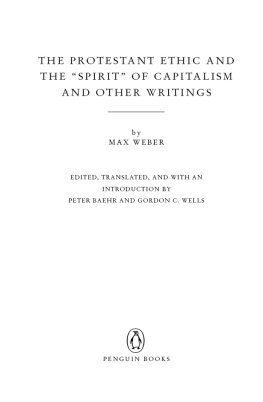

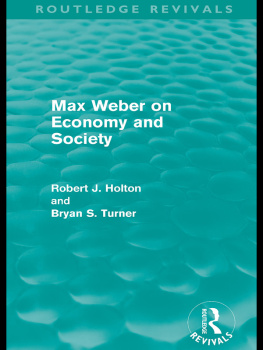

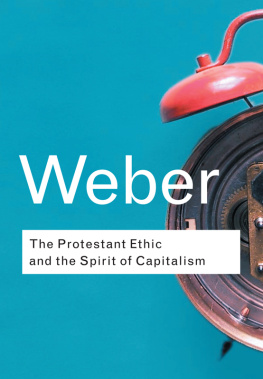
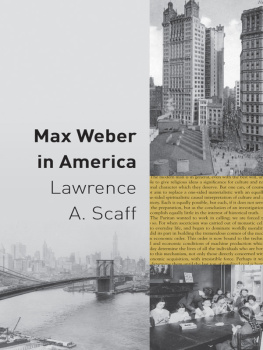
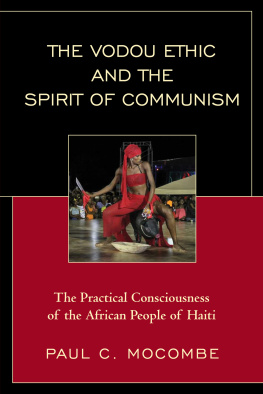
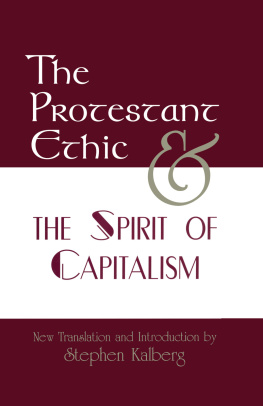

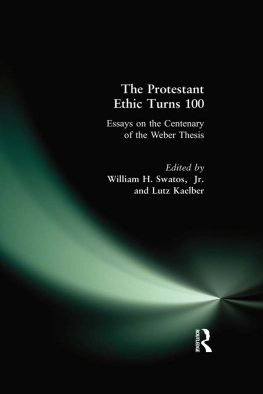

 CLASSICS
CLASSICS